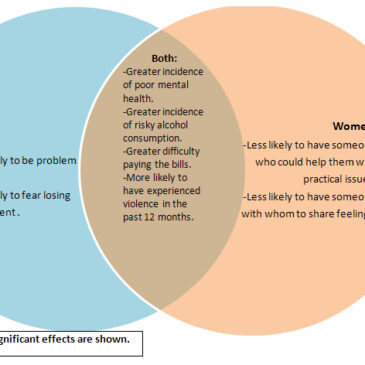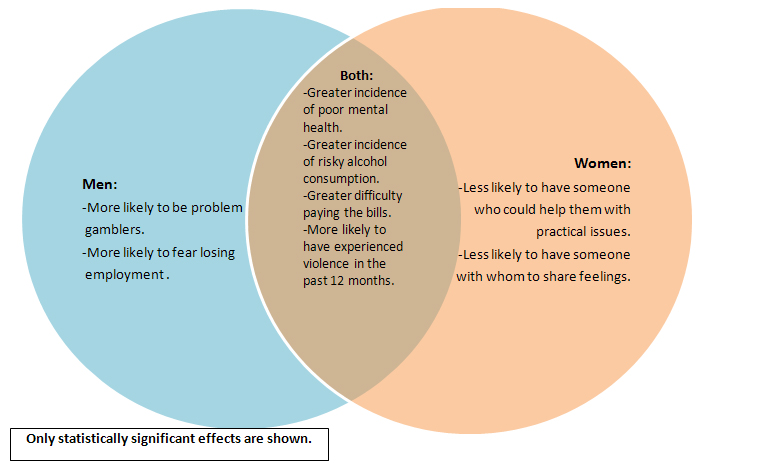Gambling Disorder creates havoc for people who gamble. It might also create havoc for Concerned Significant Others (CSOs) — gamblers’ parents, spouses, children, friends, and colleagues (Shaw, Forbush, Schlinder, Rosenman, & Black, 2007). Studies on the impact that gambling-related problems have on personal and social relationships for CSOs are scarce. This week’s The WAGER reviews a study that examined the health, social support, and financial situations of CSOs (Svensson, Romild, & Shepherdson, 2013).
Methods
- The authors analyzed data from Swedish Longitudinal Gambling Study, a population study on gambling and health that collected data from participants through computer-based telephone interviews at 2 separate waves.
- In both waves, participants reported if someone close to them had problems with gambling. They also reported on their health, financial hardship/job security, experiences of physical violence, risky alcohol consumption, social support, and problem gambling.1
- Wave I included 8,165 respondents between the ages of 16 and 84 years old.
- Wave II included 6,021 of the Wave I respondents, which corresponds to a 74% retention rate.
- The researchers compared individuals who reported being CSOs to those who were not CSOs. The researchers also examined gender differences.
Results
- Of the Wave I sample, 18% identified as a CSO. A greater proportion of men (9.5%) than women (8.5%) identified as CSOs.
- The Figure shows ways in which CSOs differed from the remaining general population at Wave I.
- By Wave II, 47.4% of those who were CSOs in Wave I became ex-CSOs.
Figure. Male and Female CSOs Compared to the Remaining General Population (Wave I Results). Click image to enlarge.
Limitations
- The nature of the relationship between the CSO and the problem gambler was not reported. Some CSOs might have been spouses of CSOs, some might have been parents, and some might have had other types of relationships. It would be interesting to explore whether people who are closer to those experiencing gambling disorder (e.g., spouses) are more impacted than people who are more distant (e.g., colleagues).
- Respondents were asked if someone close to them had or had previously had gambling problems; therefore, there is no way of knowing whether there are differences between those who currently knew someone with gambling problems.
- We cannot infer a causal relationship between being a CSO and having negative health, social, or financial issues because not all of the criteria for causality have been met.
Conclusions
The results of this study support the idea that CSOs suffer from serious and long-lasting mental health, social support, and financial effects. Though male and female CSOs experience many of the same difficulties, there were some marked gender differences. Male CSOs were more likely to be problem gamblers, and to have more work, debt, and legal problems than female CSOs. Female CSOs, on the other hand, were more likely than male CSOs to experience problems in relationships and to have greater physical and mental health difficulties. While this study showed important gender differences between CSOs, future research could examine differences between other types of CSOs. For example, there may be significant differences between colleagues and spouses of problem gamblers that could further illuminate the adverse effects that CSOs experience. Though CSOs show negative effects in various domains, ex-CSOs offer hope that there are opportunities for positive change.
– Melanie Mitchell
What do you think? Please use the comment link below to provide feedback on this article.
References
Ingle, P.J., Marotta, J., McMillen, G., Wisdom, J.P. Significant others and gambling treatment outcomes. Journal of Gambling Studies, 24(3), 381-392.
Shaw, M., Forbush, K., Schlinder, J., Rosenman, E., Black, D.W. (2007). The effect of
pathological gambling on families, marriage, and children. CNS Spectrums, 12(8), 615-622.
Svensson, J., Romild, U., & Shepherdson, E. (2013). The concerned significant others of people with gambling problems in a national representative sample in Sweden- a 1 year follow-up study. BMC Public Health, 13.
________________
1Researchers asked the following information for each of the variables:
- Health: Asked “how would you assess your general health?” on a 5-point scale that ranged from “very good” to “very bad.”
- Financial hardship and job security: Asked whether the respondent had difficulties paying bills in the last 12 months, and whether they feared losing employment.
- Physical violence: Asked whether the participant was subjected to physical violence in the last 12 months and during his/her lifetime.
- Risky alcohol consumption: Utilized three questions from the Alcohol Use Disorder Identification Test (AUDIT), developed by the World Health Organization to identify whether a person’s alcohol consumption could damage their health.
- Social support: Assessed whether the respondent had someone to turn to when in need of practical help, and whether they had someone with whom to share their innermost thoughts and feelings.
- Problem gambling: Used the Problem Gambling Severity Index (PGSI) to measure risk for problem gambling. Those with moderate or higher risk were merged into a problem gambling group.





